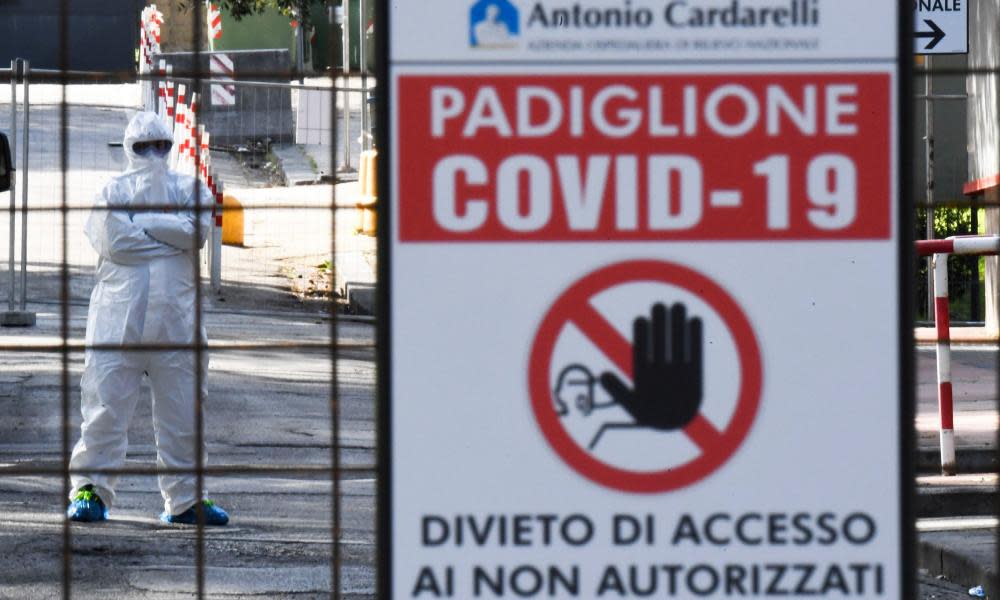Italy's pandemic plan 'old and inadequate', Covid report finds

A severely outdated pandemic plan could have contributed to thousands of Covid-19 deaths in Italy, according to a report set to be presented to prosecutors investigating alleged errors by Italian authorities.
Italy had only “an old and inadequate plan” that “makes no mention of scenarios and planning assumptions”, according to the 65-page report compiled by the retired army general Pier Paolo Lunelli, and seen by the Guardian.
Lunelli estimated that as many as 10,000 of Italy’s over 35,000 deaths may have been attributed to the lack of sufficient anti-pandemic protocols.
Italian authorities allegedly failed to update the country’s pandemic plan in 2017, when the World Health Organization (WHO) and European Centre for Disease Prevention and Control (ECDC) established new guidelines.
A “Flu pandemic plan” published on the Italian health ministry’s website shows it was last updated on 15 December 2016. However, the document’s properties on Abode Acrobat Reader show it was created in January 2006.
“When you change a document, you should also change the title,” Lunelli, a specialist in NBC warfare and planning operations, told the Guardian. “It could be correct that Italy may not have updated its plan since 2006.”
In his report, Lunelli compared Italy’s plan with those of other European countries.
“We’re not the only ones with an old plan,” he said. “The difference was that we were the first European country to be hit by the virus, whereas others had time to plan.”
The UK had an “exemplary” anti-pandemic plan and should have been able to contain the virus even better than Germany. The UK was considered to be one of the world’s leaders in pandemic planning, rated last year as second in the world after the US by the Global Health Security Index for its biological security strategy, published in 2018. But as with the US, it has been criticised for the gap between theory and action.
Britain found itself at the back of the global queue for essential pandemic-fighting equipment, including masks and other protective equipment for health staff and carers and vital chemicals for tests. The House of Commons public accounts committee also expressed astonishment last month that there was no planning for the impact on the economy.
“I have to say that the UK was in the best situation, but performed the worst,” Lunelli said.
Italy was the first European country to be hit by the coronavirus pandemic in late February, when the country scrambled to quarantine 10 towns in the Lombardy region and one in Veneto after the first local transmission was confirmed.
A national quarantine was enforced on 9 March as the death and infection toll climbed rapidly and hospitals became overwhelmed. The majority of Italy’s Covid-19 deaths have been in Lombardy, where an investigation driven by NOI Denunceremo, a group set up by relatives of the dead, is under way into possible criminal negligence by authorities.
As a result of Lunelli’s report, the group, which has already submitted over 150 legal complaints to prosecutors, will also file a complaint against all of Italy’s prime ministers and health ministers since 2013 for failing to update the pandemic plan.
Lunelli, who said he would be willing to face a prosecutor, wrote in his report that the lack of an effective plan had serious consequences on the number of victims and the economy.
“Coping with a pandemic without good plans, with insufficient intensive care skills and a scarce stock of health protection devices, is like finding yourself driving a bus on a mountain road in the middle of a sudden and heavy snowfall without snow chains,” he wrote.
“Unfortunately, the Italian bus ended up off the road with serious consequences in terms of direct and indirect victims as well as the economic downfall of some regions that mostly contribute to the national GDP.”
On 13 May, the WHO published an independent narrative report, examining what happened at the beginning of the pandemic in Italy. The objective was to help other countries avoid the sort of disaster that occurred in Lombardy. It was called: “An unprecedented challenge; Italy’s first response to Covid-19”.
But the following day, the report was taken down from the WHO website and references to it were deleted, at the request, the Guardian understands, of Dr Ranieri Guerra, WHO’s assistant director-general for strategic initiatives.
The report, prepared by the Covid-19 Emergency Team at the WHO European Office for Investment for Health and Development in Venice, stated that Italy’s pandemic plan dated to 2006, in the aftermath of Sars, and was later “reconfirmed”.
Dr Guerra has been the director general for preventive health at the Italian ministry of health and chief medical officer of Italy since 2014 – in charge of the office that was responsible for any updating.
“Italy was not totally unprepared for an epidemic when the first news bulletins came from China,” said the deleted report. “In 2006, after the first severe acute respiratory syndrome (Sars) epidemic, the Italian ministry of health and regions approved a national pandemic influenza preparedness and response plan, reconfirmed in 2017, with guidelines for regional plans.”
Guerra declined to speak to the Guardian when contacted on Wednesday.


